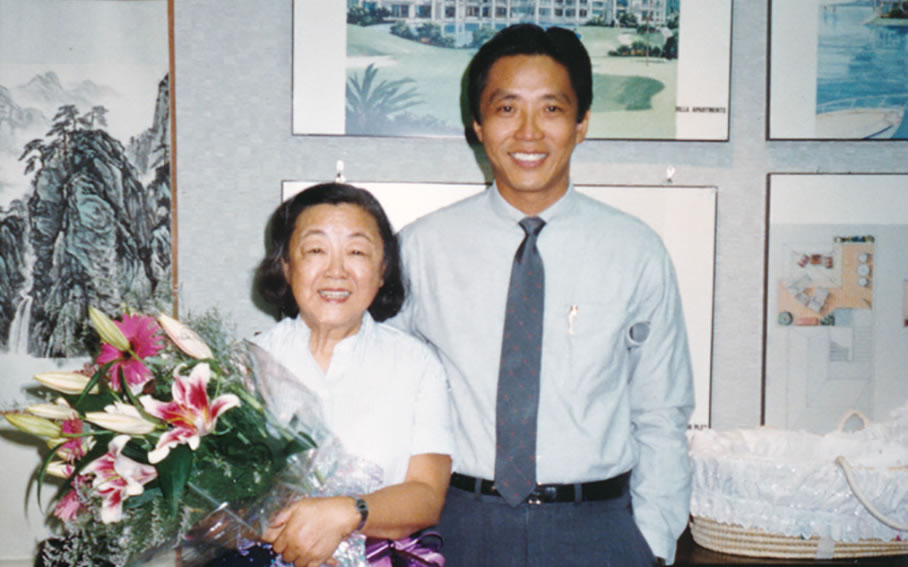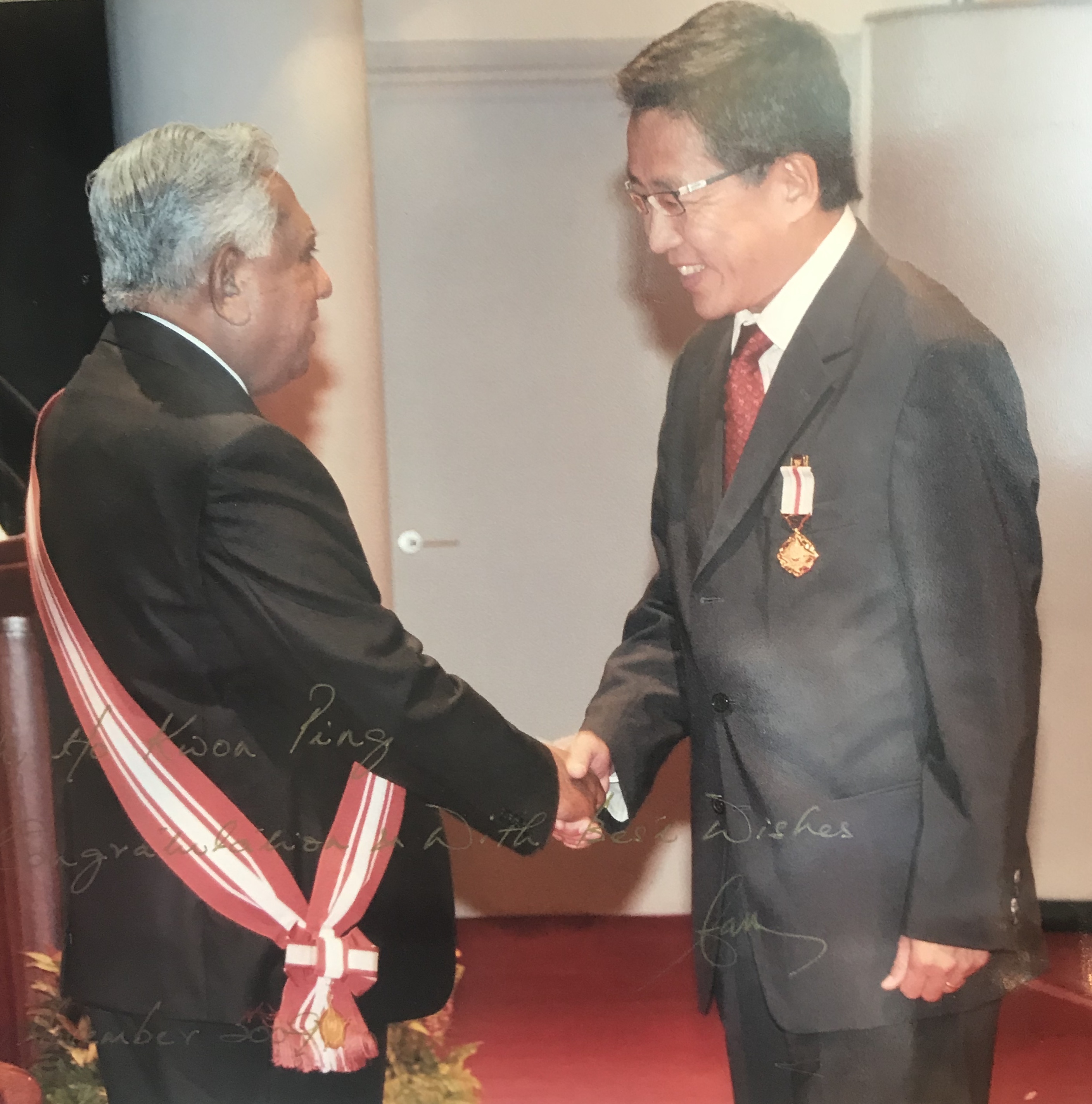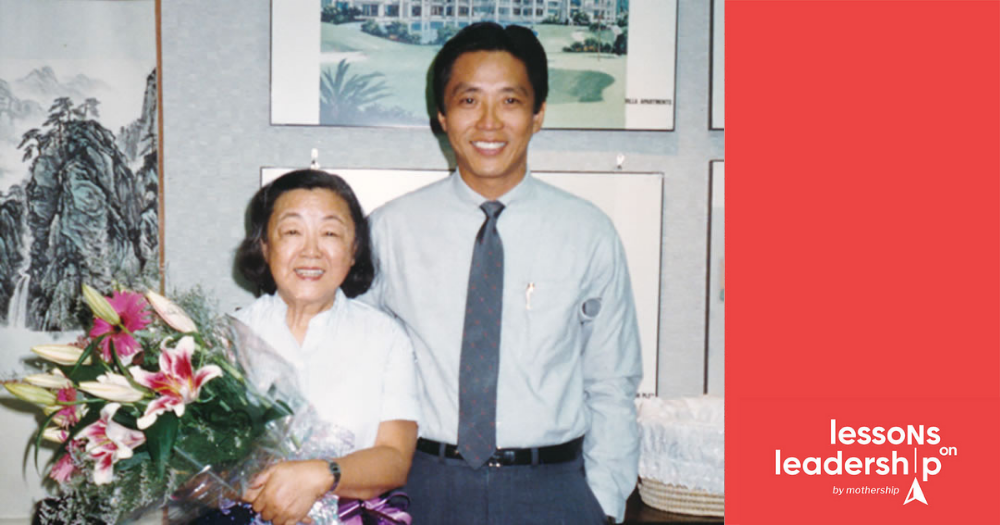Follow us on Telegram for the latest updates: https://t.me/mothershipsg
COMMENTARY: "You start to realise that very often, people want you to talk about it. They just don't know how to broach it."
Banyan Tree Holdings co-founder and executive chairman Ho Kwon Ping shares his insights on the art of conversation, especially when it involves difficult and taboo topics like death and suffering.
As part of Lessons on Leadership, a series hoping to inspire the next generation of Singaporeans through the stories of Singapore’s many successful business leaders and entrepreneurs, Ho relates his personal life experiences — such as the death of his loved ones — to how it has helped him become a more empathetic leader who is able to connect with others.
By Ho Kwon Ping, as told to Jane Zhang
I learned about death with my own mother.
 Ho with his mother, chemist and bilingual writer Li Lienfung. Photo via Esplanade website.
Ho with his mother, chemist and bilingual writer Li Lienfung. Photo via Esplanade website.
I saw her every week — the children, my wife, and I saw her once week, and then I saw her alone once a week, just for a meal. We both loved sake, we both liked to drink, and we toasted each other all the time.
And so we had that meal where we each had two small bottles of sake, which is quite a bit. And then for some odd reason we started talking about death. We talked about my father, who spent six years being in an almost-comatose state before he died.
She said, "You know, you will die too."
And I said, "And you will die before me." And she said, "You will die also."
You know, when you're a little bit drunk, you can be more open talking about things.
And then she said one thing which I will always remember and which I've always recalled when anyone talks to me about death. And it's not as if we were very serious but it was indeed very deep in its own way:
"There's no good time to go. There's only a good way to go."
Because nobody wants to die; we all die. And so there's no point in talking about a good time to go. You never want to go. There's only a good way to go.
And we left it at that and we had a great meal.
I never thought anything much about it, and then the Monday after that, she had a massive aneurysm, and she went to hospital. She was unconscious immediately, and three days after that she died.
Learning from mother's death
My reaction to my mom's death and my sister's reaction was really quite different. My sister lives in New York, which is about as far away from Singapore as you can get.
And so she has not been able to come back very often. She's often said she wanted to, but then when the time came, she had one reason or another for not being able to. They met each other maybe once every 18 months for the last years of my mother's life.
She felt so guilty for not coming back and really reacted very badly to our mother's death.
My mom's death taught me that you must not wait. You must not have any regrets.
Similarly, after former-President S. R. Nathan — who had been a family friend for many years — stepped down from his presidency, we visited him quite a bit in his home, and he became an SMU Fellow, so I would visit him at his office at SMU.
 Ho with former president S. R. Nathan. Photo courtesy of Ho.
Ho with former president S. R. Nathan. Photo courtesy of Ho.
As we hadn't visited him for quite a while, we went to visit him. And it was great — we hadn't seen him for months.
Right after that, he had a massive stroke. And his Aide-de-Camp gave me a letter that was not sent off to me — which was a very last letter he wrote — because he always writes a little handwritten notes to people after they visit.
It was a very nice note, very warm and personal.
In a eulogy to him at SMU, I told all the students that the lesson is you should never delay, you should never put off doing something that you think you should do for other people, whether it be a teacher, relative, or anybody else. Because you never know whether you may regret not doing it because it may be too late.
The art of conversation
During Covid, I have reignited old friendships. I have Zoomed with friends I had not seen for 40 years.
There was one lady who was about 10 years older than me — so now, she'd be in her 80s — and she was like a mentor. She and her husband were young graduate students when I was an undergraduate, and we kept in touch over the years, but I had not seen her for 45 years.
I have got classmates from Bangkok whom I exchange Christmas cards with.
People in the old days used to talk about conversations being a serious thing. You know, the sort of Jane Austen days when people would have tea and talk.
But today, actually, with Facebook and social media apps, we've actually lost a lot of the ability to sense the nuances in body language, tone of voice, subtleties of conversations, catching words and phrases — that is really the art of conversation.
And the art of conversation is so critical, particularly now for young people. And particularly during a time of Covid, when everyone is so physically isolated and tired.
Because we are so isolated, we look forward to doing things with friends – and because you have nothing else to do when you're stuck due to Covid-19 restrictions, you have to meet a friend via Zoom.
Covid has actually helped to enhance the nuances of language in a really very ironic manner; you would never have thought it would — it should be very dehumanising, but in some ways, it's not.
You know how if you just have a meal, sometimes you can talk about all kinds of things and don't really sense a person? But when you're Zooming somebody you haven't met for 40-over years, you actually find that the barrier of Zoom allows you sometimes to actually open up a little bit more.
You're looking at somebody, you're facing somebody — obviously it's not that easy to have conversation, but words become more important. You're not just having a meal. It's about talking, and how language and its nuances are so important.
Learning to talk about death
In May, I did a Zoom call with a close Tibetan friend and business partner, who had introduced me to our first project in China – in Lijiang and Ringha, Tibet, and whom I had not seen for eight years as our lives and businesses grew apart.
He was dying of last-stage stomach cancer and had a few weeks to live. He Zoomed me lying on his bed, with his head often dropping below the camera.
I didn't realise he was that close to death, but I decided that we should talk about it, based on a few times I've talked about death with other good friends.
I broached the subject by saying, "You know, well, this might be the last time. We're not going to see each other. It's been a good time."
I asked, "How does the future look?" And he said, "Not very good. Doctors say not very long." So then I said, "Are you prepared?"
We reminisced and openly talked about life and death. And then he talked about being a Buddhist, and how he realises that life is impermanent. We talked about whether we believe in a heaven — and I don't — and what happens to us when we die.
We laughed, recalled old stories, shed a few tears. And I think he felt much better afterwards. He invited me to his virtual memorial service and I agreed.
You start to realise that very often, people want you to talk about it. They just don't know how to broach it.
Can you imagine, if you're dying and saying goodbye to a dear friend, wouldn't you actually want it to be out in the open already?
It ended with me saying, "I hope to see you again shortly in a call, maybe in a week or two." He said, "Yeah, maybe."
And then two days later, his wife sent me a note saying he had passed away peacefully.
But I actually felt very good. Because we really connected before he left us.
And I think a lot of people go through life with a lot of these personal or social taboos.
But it's not a social taboo to talk about death if you really want to. It's just that everybody imposes it upon themselves. You meet a friend who's got cancer, you just kind of try to change the subject. You don't ask openly, "How long do you think you've got left?
Personal life experiences turned into leadership lessons
And that's why it's important for leadership too — because leadership is not just about business leadership. It makes you a better person because it makes you more sensitive to other people's needs, and not only your own needs.
A lesson in leadership is that sometimes you try to be very funny and make jokes — as I tried to do — and lift up people's spirits, but that's not the only way to deal with it, that's not the only way to be a leader.
In the beginning of the pandemic, you try to give hope to people. Every company and every CEO has concrete measures and different things that they're trying to do.
It's been nearly two years since Covid hit. A lot of companies have tried to do whatever they can, and we're surviving quite okay. But a lot of our associates are hurt. They're on long-term unpaid leave or high levels of unpaid leave in my industry.
Sometimes, being a leader requires you to sense what really is hurting people, and to confront those fears and to talk about those fears.
You don't need to say, "This is what I'm trying to do." They want to hear that you understand their pain. That's all.
The mere acknowledgement that, 'I know how you feel and I know it hurts. I also know there's nothing I can do, and there's nothing anybody can do.'
It's the same thing with death, too — that when you first talk to someone about death, it's always "Oh, have you seen this doctor? Have you gotten a second diagnosis? What are the options?" Blah, blah, blah.
After a while, if you keep on badgering people about that, they actually get pretty irritated. Because what they're thinking in their minds is, "Don't you just recognise that we don't need to talk about that anymore? I am going to die."
Just like somebody who's really suffering and unemployed can actually think to themselves, if you're talking about all the great things you can do to get by, "You don't think I tried that? You think I'm stupid? You think I'm lazy? I just need somebody to sit and basically say, 'I know it hurts.'"
At some point, when there's not much you can do anymore, it's not productive to pretend you can do a lot more. It's actually more important to say you understand where they're coming from. By showing empathy, even though you know you can't do anything.
Openness starts with sharing, not just listening
Once you try this approach — to be more open with people and to talk to them openly about their ideas and this and that — you realise that the communication benefits both sides so much more, and you want to continue doing it.
The real problem is in getting someone to open up more about themselves. If anything at all, I think it's about openness with yourself.
Because you can't be more open with other people, unless you're more willing to be open about yourself.
And it cannot be one-sided. It cannot just be you listening to people.
If you want to connect with someone and you want to talk to them about their fears of unemployment, you have to be willing to talk about your own fears, and your ideas about death — and that's what most people don't want to do.
So when I talk to people about unemployment and not having jobs, I have to talk about my own fears and how I wake up in the middle of night worrying that I've lost the whole company.
And it's different from being out on the streets and wondering about savings, but to think that I've lost everything that I've built — whether it be a big empire or your own small little house — this is the same kind of fear that everyone is consumed by.
Although, of course, I'm lucky I don't have to worry about feeding my family, while some of them do. But it's still conveying this idea that I have fears too, and that I worry as much as they do.
Most people in a leadership position think that that's a sign of weakness.
I think one of the points about leadership is to be able to anticipate and sense what's on people's minds — fears, anxieties that people have, and to confront those openly, and to deal with it in an honest manner.
You've got to share about your feelings of death. You've got to share about your feelings of unemployment, your own inadequacies. Then you'll find that people connect with you.
Top photo via Esplanade website. Some quotes have been edited for clarity.
If you like what you read, follow us on Facebook, Instagram, Twitter and Telegram to get the latest updates.
